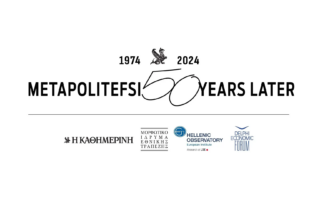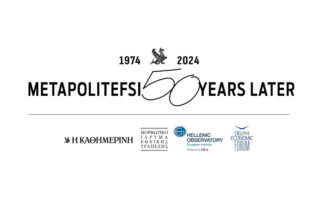Foreign policy milestones: EU accession, Turkey, Cyprus, Prespes

One of the areas where Greece made some of its greatest strides during the past 50 years has been in foreign policy, the second day of the “50 Years of the Metapolitefsi” conference heard on Friday.
A panel moderated by Kathimerini English Edition’s editor in chief, Tom Ellis, touched on milestones good and bad, demonstrating how, despite significant differences on specifics, the country’s main political forces have achieved consensus on the broad strokes of the big issues.
With three outspoken and influential former foreign ministers on the panel – Dora Bakoyannis from New Democracy, Evangelos Venizelos from PASOK and Nikos Kotzias from SYRIZA, which Ellis described as having made a “distinct imprint” on Greece’s foreign policy – the discussion was lively.
Completing the panel were Constantinos Filis, a professor of international relations at the American College of Greece and director of the ACG’s Institute of Global Affairs, and Konstantina Botsiou, a professor of history and international relations at the University of Piraeus and director at the Council for International Relations.
On the issue of Greece and Turkey and the current thaw in relations, Venizelos warned that this “momentum should not evolve into a simple moratorium,” with Bakoyannis agreeing that a “window of opportunity” has presented itself for Greece. However, she added, “it takes two to tango.”
“But if a real opportunity arises, should Greece go ahead? This is where the condition of national consensus comes in,” Bakoyannis added.
Commenting on Greece’s westward orientation, Bakoyannis, a New Democracy MP, argued that despite being “deeply hurt” during the 1967-1974 military dictatorship and “angry” at the part played by the United States, the country’s alignment with the West “has never been in doubt.”
Venizelos spoke at length about how former prime ministers Konstantinos Karamanlis and Andreas Papandreou shaped Greece’s foreign policy approach during the Metapolitefsi, which, he argued, “is not one single period.”
The coup in Cyprus in 1974 and the Turkish invasion that followed was a “national defeat” that scarred Greece’s foreign policy approach with a “guilt complex,” he said, adding that a consensus was nevertheless built in the ensuing years. “We agreed that we’re a European, Western country, but this consensus also has a second level, which is a consensus for ‘strategic inertia,’” Venizelos added.
The Greece-West relationship was shaken to its foundations during the 2010-2019 economic crisis, Venizelos added. “I lived through the collapse of public opinion’s idyll with the EU,” he said.
Filis picked up the thread to address Kotzias, noting that despite his left-wing leanings, his term in the Foreign Ministry also marked a significant improvement in Greek-American relations. “Activism is one thing; having an immediate responsibility toward the nation is another,” Kotzias responded, defending the SYRIZA-led government’s rapprochement with Washington as serving the “tradition of state continuity.”
Kotzias, who signed the Prespes name deal in 2018, also staunchly defended the accord with North Macedonia, noting that “despite the great personal and political cost, few admitted that we resolved the issue.” The agreement, he noted, also prevents Turkish foreign policy ambitions which are detrimental to Greece.
On the subject of that agreement, which deeply divided public opinion in Greece, Bakoyannis noted that she had opposed the deal on the grounds of the matters of identity and language, but conceded that it was a successful negotiation, a view also shared by Venizelos.
The conference, jointly organized by Kathimerini newspaper, the National Bank Cultural Foundation (MIET), the Delphi Economic Forum, and the Hellenic Observatory at the European Institute of the London School of Economics and Political Science (LSE), concludes on Saturday.
The full program is available here.





